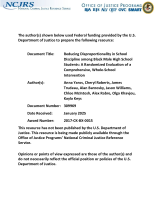Black
The role of ethnic identity in preserving the future expectations of justice-involved Black male youth in the United States following direct victimization
Racial Bias in School Discipline and Police Contact: Evidence From the Adolescent Brain Cognitive Development Social Development (ABCD-SD) Study
Differential Associations Between Legal System Contact and Internalizing Symptoms Among Latino, Black, and White Youth
Structural Factors and Black Interracial Homicide: A New Examination of the Causal Process
Race, Health, and Recidivism: Examining the Effects of Health Status and Healthcare Needs on Recidivism for Black and White Formerly Incarcerated People
Early Adolescent Attitudes Toward the Police Post-Floyd
Reducing Disproportionality in School Discipline among Black Male High School Students: A Randomized Evaluation of a Comprehensive, Whole-School Intervention
Urban Black Adolescents' Victimization Experiences: The Moderating Role of Family Factors on Internalizing and Academic Outcomes
CITIZEN SATISFACTION WITH POLICE SERVICES - INDIVIDUAL AND CONTEXTUAL EFFECTS
Beyond Monolithic Threat: Understanding Risk Typology in Court-involved Black Male Youth
Cross-sectional Study of Loss of Life Expectancy at Different Ages Related to Firearm Deaths Among Black And White Americans
Molar Crenulation Trait Definition and Variation in Modern Human Populations
Programs and Services for Black Male Survivors of Community Violence: What’s Effective?
"Roses have Thorns for a Reason”: The Promises and Perils of Critical Youth Participatory Research with System-impacted Girls of Color
Downstream Effects of Frayed Relations: Juror Race, Judgment, and Perceptions of Police
Nonfatal Firearm Injury and Firearm Mortality in High-risk Youths and Young Adults 25 Years After Detention
A Conceptual Model of Help-Seeking by Black Americans After Violent Injury: Implications for Reducing Inequities in Access to Care
Caring Connections for Youth: Evaluation of a Countywide Pre-Arrest Diversion Initiative to Reduce Racial/Ethnic Disparities
New Genus and Species of Black Coral from the SW Pacific and Antarctica (Cnidaria: Anthozoa: Antipatharia: Schizopathidae)
Inclusive Research: Engaging People Closest to the Issue Makes for Better Science & Greater Impact; 2023 NIJ Research Conference Plenary
This panel will discuss what inclusive research is, how to conduct it, and what issues and challenges exist about engaging in it. “Inclusive research” has its history as a participatory research method designed to ensure people closest to the issue or problem under study are authentically engaged in the research process rather than simply being “research subjects.” While community-based participatory research has begun to take on greater prominence in the criminal justice realm, such efforts are largely confined to qualitative research inquiries.
See the YouTube Terms of Service and Google Privacy Policy
Can Science Enhance Equity? Findings and Implications From a Study To Detect Bruising on Victims with Dark Skin Pigmentation
This plenary panel from the 2023 NIJ Research Conference features fascinating research on a methodology to improve the detection and documentation of bruises on victims of violence who have dark skin pigmentation. This study highlights the intersection between science, justice, and racial equity, featuring practitioner and victims’ advocacy perspectives. The discussion describes the research and its findings and explore strategies to ensure that this particular evidence-based methodology can be widely implemented by nurse practitioners in the field.
Participants:
See the YouTube Terms of Service and Google Privacy Policy




